National Minority Health Month Spotlight: ChicagoCHEC
, by CRCHD Staff
For National Minority Health Month, the National Cancer Institute (NCI) Center to Reduce Cancer Health Disparities (CRCHD) will feature researchers and projects that are dedicated to reducing cancer health disparities. This first spotlight details the work of the Chicago Cancer Health Equity Collaborative (ChicagoCHEC), an NCI CRCHD Comprehensive Partnership to Advance Cancer Health Equity (CPACHE) U54 between the Robert H. Lurie Comprehensive Cancer Center of Northwestern University, Northeastern Illinois University, and the University of Illinois at Chicago.
How “Citizen Scientists” Can Make a Difference in Prostate Cancer Disparities Research
What’s a “Citizen Scientist?”
The concept of a “Citizen Scientist” is not a new one, but the Chicago Cancer Health Equity Collaborative (ChicagoCHEC) has embraced the more than 20-year-old concept in its efforts to reduce prostate cancer disparities. The term, which originated in the environmental health movement, refers to every day, non-academically trained, concerned citizens inquiring and asking key questions about issues that impact their community, according to the PACHE U54 ChicagoCHEC team.
African American men experience prostate cancer mortality rates “at least double those for European American men,” according to the team, which is made up of Josef Ben-Levi, EdD, Tiffany McDowell, PhD, Adam B. Murphy, MD, MBA, MSCI, Marcus Murray, BS, MPH, and Karriem Watson, DHSc, MPH, MS. Yet, they say this population is underrepresented in biomedical research and in prostate cancer guidelines. The team chose to engage Citizen Scientists in addressing these disparities based on a Community-Based Participatory Research principle spearheaded by its non-academic stakeholder partner, Mr. Murray of Project Brotherhood, that when you engage Black men as “equitable partners in research,” you can “mitigate and address the historical barriers,” Watson said.
Enlisting a Team of Citizen Scientists
To assist in addressing this prostate cancer disparity, ChicagoCHEC ultimately hopes to validate the use of the Prostate Health Index (PHI) as a biomarker for the Black population, as PHI is more specific than PSA in identifying potentially deadly prostate cancer, and using PHI might lead to fewer unnecessary biopsies and misdiagnoses of prostate cancer.
To begin this effort, the team successfully identified and trained eight African American Citizen Scientists—Dr. Ben-Levi, Julian DeShazier, Ray Willis, Roger Dickson, Terry Murphy, Melvin Thompson, Sam Jackson and Fletcher Williams—the first of its three aims for this NCI CRCHD CPACHE U54 Pilot Project. Dr. Ben-Levi, who is a Multi-Investigator on the trial from Northeastern Illinois University and a prostate cancer survivor, brought his lived experience to the program to help engage the Citizen Scientists. The second charge was for the Citizen Scientists to engage their social networks to recruit a healthy cohort of Black men in order to “establish normal ranges” for PHI, which would eventually be compared with data from Black men with low- and high-grade prostate cancer from other cohorts.
Pursuing a Healthy Cohort
ChicagoCHEC coordinated seven community events to reach out to Black men ages 40-79 without elevated PSA or prostate cancer. The Citizen Scientists assumed increasing levels of responsibility as each event took place, from observing at the beginning, then to planning, facilitating, registering, recruiting and co-leading. As the role of the Citizen Scientists grew from event to event, so too did the number of people who participated. The Citizen Scientists co-led a three-day screening event in Chicago’s Washington Park, for example, and 103 Black men agreed to join the study.
"What we learned from the engagement of Black men as partners in research is that it is not hard to engage Black men in research, but you must meet them where they are, and having a trusted stakeholder from the community can further advance trust."
After the seven events, the team had recruited 139 Black men, including meeting its goal of 125 men with PSA levels within the cohort range.
What’s Next?
The third and final aim for the pilot project is validation of the new prostate cancer biomarker for Black men.
On this aim, Dr. Murphy noted that: “The data from this project provides some preliminary proof of concept that the PHI test can discriminate between Black men without prostate cancer and with negative prostate biopsies from Black men harboring potentially lethal Gleason 7 to 10 prostate cancer. PSA testing results in nearly one million prostate biopsies performed each year, and 70% of them will not reveal a significant prostate tumor. Our data is identifying cutoff values for PHI in Black men with PSA levels between 4-10 to help Black men avoid unnecessary prostate biopsies. But future larger randomized trials will need to be conducted to validate our work.”
Advancing Health Across Communities
While its work is not yet done, ChicagoCHEC has illustrated how it can positively impact health in multiple communities. For the research community, empowering African American men as Citizen Scientists enables them to be “participant partners” in advancing health equity research and minimizing disparities in health outcomes, according to Watson. At a broader level, these Citizen Scientists demonstrate that the research community can be connected with African American males, who are often perceived as a “hard-to-reach population” in research, Watson says.
The project represents an opportunity to increase engagement and improve health in racial and ethnic populations and other geographic areas, as the group has been and remains focused on scalability, intending to make the Citizen Scientists approach reproducible elsewhere.
Finally, through its partnership with Project Brotherhood, ChicagoCHEC has the opportunity to connect with Black males—in its very own community and on an ongoing basis—for health disparities research.
“…We are able to reach African American men where they live, work, play and pray, thereby decreasing the burden of care placed on underserved communities,” Watson said.
